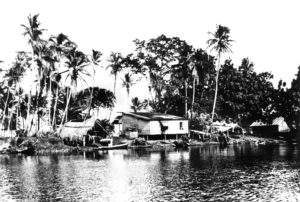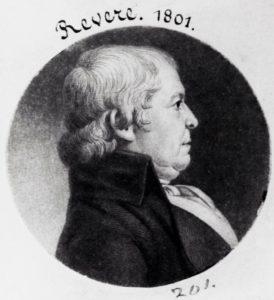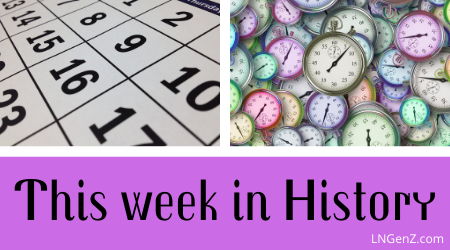-
January
-
February
- This Week in History: February 6-12 – Lesson
- This Week in History: February 6-12 – Quiz
- This Week in History: February 13-19 – Lesson
- This Week in History: February 13-19 – Quiz
- This Week in History: February 20-26 – Lesson
- This Week in History: February 20-26 – Quiz
- This Week in History: February 27-March 5 – Lesson
- This Week in History: February 27-March 5 – Quiz
-
March
- This Week in History: March 6-12 – Lesson
- This Week in History: March 6-12 – Quiz
- This Week in History: March 13-19 – Lesson
- This Week in History: March 13-19 – Quiz
- This Week in History: March 20-26 – Lesson
- This Week in History: March 20-26 – Quiz
- This Week in History: March 27-April 2 – Lesson
- This Week in History: March 27-April 2 – Quiz
-
April
- This Week in History April 3-9 – Lesson
- This Week in History April 3-9 – Quiz
- This Week in History: April 10-16 – Lesson
- This Week in History: April 10-16 – Quiz
- This Week in History: April 17-23 – Lesson
- This Week in History: April 17-23 – Quiz
- This Week in History: April 24-30 – Lesson
- This Week in History: April 24-30 – Quiz
-
May
- This Week in History: May 1 – 7 – Lesson
- This Week in History: May 1 – 7 – Quiz
- This Week in History: May 8 – 14 – Lesson
- This Week in History: May 8 – 14 – Quiz
- This Week in History: May 15 – 21 – Lesson
- This Week in History: May 15 – 21 – Quiz
- This Week in History: May 22-28 – Lesson
- This Week in History: May 22-28 – Quiz
- This Week in History: May 29-June 4 – Lesson
- This Week in History: May 29-June 4 – Quiz
-
June
- This Week in History: June 5 – 11 – Lesson
- This Week in History: June 5 – 11 – Quiz
- This Week in History: June 12-18 – Lesson
- This Week in History: June 12-18 – Quiz
- This Week in History: June 19-25 – Lesson
- This Week in History: June 19-25 – Quiz
- This Week in History: June 26 – July 2 – Lesson
- This Week in History: June 26 – July 2 – Quiz
-
July
- This Week in History: July 3 – 9 – Lesson
- This Week in History: July 3 – 9 – Quiz
- This Week in History: July 10 – 16 – Lesson
- This Week in History: July 10 – 16 – Quiz
- This Week in History July 17 – 23 – Lesson
- This Week in History July 17 – 23 – Quiz
- This Week in History – July 24-30 – Lesson
- This Week in History – July 24-30 – Quiz
- This Week in History: July 31 – August 6 – Lesson
- This Week in History: July 31 – August 6 – Quiz
-
August
- This Week in History: August 7-13 – Lesson
- This Week in History: August 7-13 – Quiz
- This Week in History: August 14 – 20 – Lesson
- This Week in History: August 14 – 20 – Quiz
- This Week in History: August 21 – 27 – Lesson
- This Week in History: August 21 – 27 – Quiz
- This Week in History: August 28 – September 3 – Lesson
- This Week in History: August 28 – September 3 – Quiz
-
September
- This Week in History: September 4 – 10 – Lesson
- This Week in History: September 4 – 10 – Quiz
- This Week in History: September 11 -17 – Lesson
- This Week in History: September 11 -17 – Quiz
- This Week in History: September 18 – 24 – Lesson
- This Week in History: September 18 – 24 – Quiz
- This Week in History: September 25 – October 1 – Lesson
- This Week in History: September 25 – October 1 – Quiz
-
October
- This Week in History: October 2-8 – Lesson
- This Week in History: October 2-8 – Quiz
- This Week in History: October 9 –15 – Lesson
- This Week in History: October 9 –15 – Quiz
- This Week in History: October 16–22 – Lesson
- This Week in History: October 16–22 – Quiz
- This Week in History: October 23–29 – Lesson
- This Week in History: October 23 –29 – Quiz
- This Week in History: October 30 – November 5 – Lesson
- This Week in History: October 30 – November 5 – Quiz
-
November
- This Week in History: November 6 – 12 – Lesson
- This Week in History: November 6 – 12 – Quiz
- This Week in History: November 13 – 19 – Lesson
- This Week in History: November 13 – 19 – Quiz
- This Week in History: November 20 – 26 – Lesson
- This Week in History: November 20 – 26 – Quiz
- This Week in History: November 27- December 3 – Lesson
- This Week in History: November 27- December 3 – Quiz
-
December
This Week in History: April 17-23 – Lesson

Landing at the Bay of Pigs (Photo by: Photo12/Universal Images Group via Getty Images)
The Bay of Pigs and Paul Revere’s Midnight Ride.
“Without words, without writing and without books there would be no history, there could be no concept of humanity.” ~ Hermann Hesse
April 17, 1961: The Bay of Pigs Invasion
The 1960s was an uneasy time in the United States. Americans were concerned about the ideas of communism spreading around the world. One of America’s worries was an island 90 miles south Florida – Cuba. Communist leader Fidel Castro had revolted and taken control of the country from President Fulgencio Batista, who was supported by the US.
About 1,400 Cubans who were against the new regime invaded the island’s coast along the Bay of Pigs. The group had expected air support from the US to help overthrow Castro, but no help arrived. The anti-Castro troops were met and overrun by 20,000 Cuban soldiers and then sent to jail. President John F. Kennedy had canceled the air strikes at the last minute, hoping it wouldn’t look like the US was behind the attack, but the failed coup attempt worsened relations between the two countries and led to the Cuban Missile Crisis.
April 18, 1775: The Midnight Ride of Paul Revere
Americans were still under British rule at this time, but the American Revolution would begin in just one day with the “shot heard around the world.”

Portrait of Paul Revere (Photo by DeAgostini/Getty Images)
Paul Revere was a messenger, and on this date, Dr. Joseph Warren gave him the dangerous task of going to Lexington, Massachusetts, to warn that British soldiers were nearby and about to march on the city. Warren believed they were going to arrest Samuel Adams and John Hancock, two of the leaders of the Sons of Liberty.
Revere took on the mission, but first contacted a friend, instructing him to hold two lit lanterns in the tower of Christ Church, which is now the Old North Church. This would tell fellow Sons of Liberty, who were across the Charles River, that there was trouble coming, in case Revere couldn’t make it out of town.
The messenger travelled from Boston. He went to the city’s North End waterfront where two of his friends rowed him across the river. They had to sneak past a British warship, the HMS Somerset, but Revere made it safely to shore. Revere was warned that there were a lot of British officers in the area who might try to stop him.
By this time, it was around 11 p.m. and it took him about an hour to reach Lexington by horse. He arrived at the house where Hancock and Adams were staying. Now, you might have heard that Revere went riding through the streets yelling, “the British are coming! The British are coming!” That is not exactly correct.
A guard outside the house told Revere not to make so much noise. He responded with:
“Noise! You’ll have noise enough before long. The regulars are coming out!”

Revere’s message was correct; the next day the British arrived. The militia and British troops stood apart from each other on Lexington Green. No one knows who fired the first shot, but it became known as the “shot heard around the world” and was the beginning of the American Revolution.
Other Notable Mentions
April 18, 1906: The San Francisco Earthquake of 1906 struck the city and caused a fire that lasted for three days.
April 18, 1942: During World War II, the first air raid on Japan occurred, led by General James Doolittle.
April 17, 1982: Queen Elizabeth II signed the Canada Constitution Act of 1982 which provided Canada with a new set of laws and civil rights.
April 19, 1775: The “shot heard around the world” started the American Revolution at dawn in Massachusetts when around 70 armed militiamen stood across from a British advance guard unit on Lexington Green.
April 21, 1836: Led by Sam Houston, the Battle of San Jacinto took place against Mexican forces led by Santa Anna near what is now Houston, Texas. The Texans defeated the Mexicans and achieved their independence.

William Shakespeare (Photo by Universal History Archive/Getty Images)
April 22, 1889: The Oklahoma land rush started with a single gunshot that signaled settlers could claim land for their own.
April 22, 1864: The motto “In God We Trust” was added on all newly minted US coins.
Famous Birthdays
John Pierpont (J.P.) Morgan (April 17, 1837) was born in Hartford, Connecticut. He was excellent with management skills and helped to reorganize failing companies so that they would become profitable. In 1985, Morgan helped the US Treasury by carrying out a private bond sale.
Clarence Darrow (April 18, 1857) was born in Kinsman, Ohio. A lawyer known for taking on cases that were not popular, he defended a teacher who had been teaching the theory of evolution.
William Shakespeare (April 23, 1564) was born at Stratford-on-Avon, England. He is considered the most influential writer of the English language, with 154 sonnets and 36 plays, including Romeo and Juliet and Hamlet.
James Buchanan (April 23, 1791) was born in Cove Gap, Pennsylvania. He was the 15th president of the US and the only life-long bachelor to live in the White House.